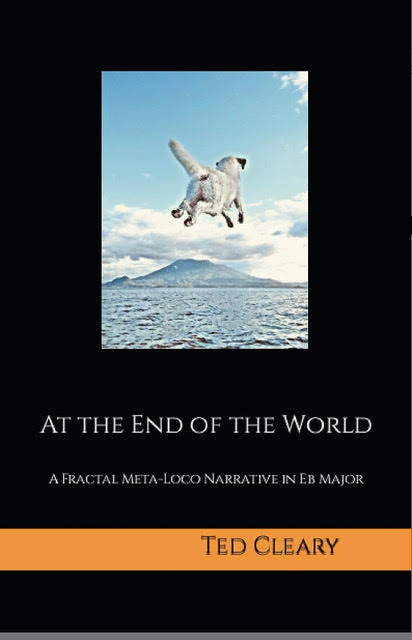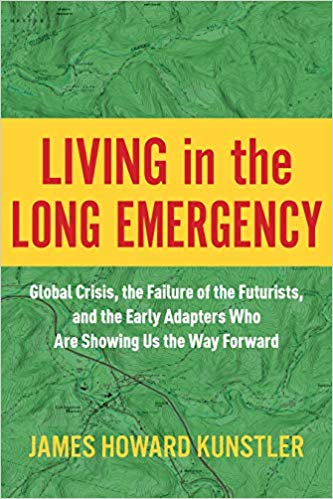Support this blog by visiting Jim’s Patreon Page
And thanks to all my Patrons for your support!
Dmitry Orlov is a Russian-American engineer and author of many books on culture and politics. He emigrated to the US with his parents at age 12 and as a young adult sojourned in Russia, where he witnessed the aftermath of the Soviet collapse. He spent many more years back in the USA living on a sailboat in Boston Harbor and later in South Carolina. His books include Reinventing Collapse, which compares the Soviet fall with the prospective crackup of the USA, followed byThe Five Stages of Collapse, and many books of essays. Dmitry moved back to his native Russia in 2016, citing a desire to return to his roots and to live in a country he felt was more stable and aligned with his values. He blogs at Club Orlov.
The KunstlerCast theme music is the beautiful Two Rivers Waltz written and performed by Larry Unger
Direct Download: KunstlerCast 406 — Reinventing Dmitry Orlov in Russia
Please send questions and comments to jhkunstler@mac.com
This podcast is sponsored by Vaulted, an online mobile web app for investing in allocated and deliverable physical gold. Vaulted is backed by McAlvany Financial Group, which owns ICA, one of the largest and longest continuously operating full-service gold brokerage firms in the United States.
To learn more visit: Kunstler.com/vaulted





 JHK’s Three-Act Play
JHK’s Three-Act Play







There seems to be a problem w/ the recording after about 32 minutes.
Same problem for me. Tried several was to listen but nothing after the 32 minutes mark
Mine cut out at the 5:28 mark. I wanted to hear more about how he refuted the strangeness of the cultures! Ugh, I hope this streaming issue gets iron out since I always enjoy hearing from Dmitry on his perspectives.
Well it finally worked itself out and I was able to make it through the complete Kunstlercast. It was great, thank you Jim!
Excellent podcast, thank you both JHK for hosting Mr. Orlov, and Dmitry Orlov for joining.
FYI, I had NO technical difficulties.
Orlov’s observations about people’s willingness to fight and die for a cause or their country, and the attachment to one’s land (Orlov used Tennessee as an example) are very important and transcend nations or events.
The willingness to die for one’s cause is a major trait (that is DECISIVE unless one side is completely outgunned by the other) that today’s anodyne American society and military don’t understand, or do not want to understand.
In the big PX, it’s “cost/benefit”. “Why don’t they do the rational thing and take the deal? We are so much stronger…”
So the US uses “tech”. All tech does is kill a lot more people on the way to defeat.
As far as attachment to one’s land, one’s roots, that is definitely NOT a trait that represents most Americans, IMO.
Our relatively “new” country (the mostly English stock who removed the Native Americans, the slaves and their descendants, and the immigrants who were later ushered in to help make the most of American’s UNMATCHED natural wealth), plus the most geographically mobile society in history don’t make for attachment to the land, or to “Tennesse”.
The most “attached” Americans are those in small-town America, whose ancestors settled there. That’s not a large portion of the population. Those roots are 100 to 350 years deep.
In the “old world”, they can be centuries, or millennia deep.
When Orlov says “Americans need to associate with their city and state, not the UNITED STATES”, that sounds good.
And he’s right.
The problem is, too many Americans have lived all over the US, and then look for ANOTHER place to retire. There is no bond.
In his comments elsewhere, Orlov noted that public health, transportation, housing, etc, help cushion the implosion of the USSR. The US doesn’t really have that.
Not in the podcast, but in his book, he also notes the shared values of much of the people, even atheists, which had been imbued on society by the Orthodox Church. His book also notes that multi-generational family units performed vital functions, such as taking care of elderly relatives and child care.
(I would add that Orthodox Church coming out of the closet, and the prayers of the faithful have helped in countless ways, big and small miracles).
In the US, day care and elder care are “contracted out”, aren’t they? But what happens when one can’t pay for child care, or assisted living, because one has no money, or… money becomes worthless?
As Orlov says, today, the uniting value in the UNITED States is money. When the money goes, so will the US.
Orlov’s books “Reinventing Collapse” and also “Five Stages of Collapse, Survivor’s Toolkit” are excellent. I’ve read them, FWIW.
Excellent podcast, thanks again.
And for what it is worth, coming from a random, anonymous CFN commenter, I commend JHK for bringing Orlov on his show, as I know that some of Orlov’s stated views completely contradict JHK’s. They weren’t discussed here, of course.
And I definitely disagree with JHK on a few topics–few in number, but of major significance. But I’m not going to argue them in this comment trail.
I will, and do, salute JHK for being big enough to host, or cite, Orlov and others who don’t see things JHK’s way all the time, and for hosting this space where CFNers can comment.
Thank you Mr. Kunstler.
Thanks…the noted glitch has been fixed and the whole show is worth a listen. JHK and Orlov go back a ways and Jimbo even references that The Long Emergency and Reinventing Collapse were published the same year (2004?). A lot of water has flowed over the dam since then, but both books remain remarkably precient 20 years later. Orlov’s background, upbringing and life experience is indeed unique and well worth paying attention to in light of current events. SocDet’s comments (above) provide a good perspective for anyone interested.
Dmitry Orlov is always a great guest here and other places. Thanks for having him on again. As for his remark “today, the uniting value in the UNITED States is money. When the money goes, so will the US”, the same is really true no matter where you go in the world. Orlov should know it is as true in Russia as anywhere else including the US. I happen to be in Russia right now: just a block away from the apartment building where I’m staying is a billboard stating: “Earn 1,500,000 rubles immediately! Sign up for contract service with the Russian Armed Forces today!” It did not occur to me until then that Russia’s colossal 2,000,000 man army is nowhere to be found in Ukraine. The entire fighting force is made up of contractors. The Wagner Group was disassembled last year and merged into the general contractor doing the fighting in the Special Military Operation. And so, a financial factor drives young men to join up to earn enough money to buy an apartment when they finish service. Also, the fact that the standing Russian army is NOT involved in the fighting in Ukraine but at the ready all around Russia’s periphery, especially the NATO frontline states, explains the on-off hesitancy of the latter to get more involved in the Ukrainian situation than they are.
Orlov’s remarks around 42:00 about the regions of Ukraine deciding matters on their own cannot be considered valid. The autonomy of the regions was dissolved in 2014 after Donetsk and Lugansk determined to make use of it and go their own way. Even before then, the governors of the regions refused to back Yanukovich as he telephoned them demanding loyalty. His flight from the country was due to the weakness of the regions. After the Maidan coup, all of the governors were fired and new ones installed. The Ukrainian constitution was amended to centralize the government, reduce the regions to geographic expressions, and remove neutrality — henceforth, Ukraine could form military alliances, especially ones hostile to Russia. I have not seen any region of Ukraine show the slightest independence since 2014. They are absolutely subservient to Kiev.
@VeldesX
“….As for his remark “today, the uniting value in the UNITED States is money. When the money goes, so will the US”, the same is really true no matter where you go in the world. Orlov should know it is as true in Russia as anywhere else…”
Taken completely literally, you are correct. Even in ancient Greece and Rome, a much simpler era, money was important. Athens and later Rome could not do what they did without money. The debasement of Roman coins was a factor in Rome’s fall.
However, the USA is completely and utterly financialized, to a greater degree than any society.
US education, US healthcare, the way people save money (401k, mutual funds, stocks, IRAs, Roth, tax-exempt bonds) is a dazzling array that is, IMO, 70% BS that offers people trained in the arcane rules of money the chance to legally skim some (that’s polite for saying charge a fee), or the holders of savings the chance to see them erode.
And our spending money is not even real money–it is plastic! It depends on technology, which depends on skilled people, to keep the systems going, defend them from fraud, and make sure that when we stick our charge cards into a gasoline pump, all goes well… A lot of people, a lot of women especially, don’t have cash. How will it go if/when the satellites go down?
There is more consumer debt in the US than anyone. People own less of their stuff in the US. So, as JHK and/or Orlov said, when the money goes bad, the music stops, the merry go round ends.
Financialization and a complex society really need money to work.
My perception is that Russia is less complex, Russians live more within their means, they have less stuff, and they are much less in debt.
You are there–would you agree?
I suppose that’s true. Personal debt is a new thing, and national debt is ridiculously low compared to the other (formerly) G8. One wonders if Russia was excluded from that club just because it was so glaringly out of touch with the ubiquitous debt trap all the others fell into.
Interesting thing is how ridiculously fast Russians have adopted plastic money, though. I visit once a year. Last year I noticed everyone sporting debit cards. This year, everyone’s paying with their phones, even the old babushkas. Credit is still a foreign idea, since interest rates are extremely high. But people are shifting away from cash at a breathtaking rate.
I’m saddened, but not surprised, to hear people shifting away from cash.
Everyone likes convenience, no matter what their background.
I think “plastic money” and “electronic transactions” are more easily compromised than cash and checks, and should the state or a bank want to control people, it become much easier.
Convenience, yes, but for whom? I get the impression the authorities — banks, local government, etc. — are the ones pushing this for their own convenience. In some cases, such as Yandex Taxis, one can only pay by phone. I wonder what non-tech folks, especially the elderly, are expected to do?
Meanwhile, the Russian consumer is gaining a lot of purchasing power, which means collecting more stuff. Used to be that Russians saved everything, no matter how decrepit, because shortages of everything meant one could never count on finding it again. Now, people are collecting junk because its cheap and available. Sort of the American throw-away consumerism, though still not on an American scale.
Sanctions have had the opposite effect intended by the West. Russian consumerism is a growing market, and therefore the market changed completely. The stores are packed with cheaper but still quality Asian goods, where they used to have expensive European and American goods.
This is especially noticeable on the roads this year: European, American, and Japanese cars are getting older and fewer. The Chinese have totally replaced them: there are entirely new Marques just for the Russian market, such as Jaekoo and Omoda. There are more Russian cars too, but the Chinese have the supermajority on the roads these days.
Key lesson: markets find a way. They always have and always will!
JHK, it was like at least 10-12 years ago and I cannot seem to find which video, podcast or speech of yours it was in but I remember your fabulous line saying: “NASCAR nation meets Weimar Republic” which makes more sense than ever today. You guys have seen it coming way before the average man on the street. Hats off to you.
I used to have a lot of time for Dimitry Orlov. But what an embittered figure he has become.
He is still singing the same old song about American decline of course. And very many of his criticisms of US society & foreign policy remain valid. But there are zero signs of individual growth. His default reaction is to blame the US for literally EVERYTHING going wrong in the world. And he “justifies” his views by embracing the crudest, shallowest and most intolerant form of Russian chauvinism on offer. In short, he comes across as a tired, cynical, sneering nationalist. His glib generalizations of other nationalities – “the Finns”, “the Poles” etc. – and his jibes about their peoples are not only distasteful but betray an atrophied intellect. No doubt this is all the effect of prolonged immersion in the closed society Russia has reverted to today: one is required to ignore inconvenient truths and unpleasant facts which interfere with a simplistic world view of Russia both as victim but also as torch-bearer of a proud civilisation.
Ignorance is one thing, but one cannot let bald-faced lying pass without comment. Take Mr Orlov’s opinions of Finland in this podcast. He seems never to have heard of the ‘Winter War’. For clarity, unlike the current Ukraine war, Russia (then part of the Soviet Union) was NOT provoked in any way in 1939. The attack on Finland by the Soviet Union was pure, unbridled aggression with the aim of grabbing territory. Stalin thought he could get away with this while the rest of Europe was focussed on Hitlers’s aggressions against Poland and then Western Europe. And he knew Nazi Germany would not interfere because of the Soviet Union’s non-aggression pact with Nazi Germany signed in late August 1939, as a result of which the Soviet Union was an ally of Hitler until he reneged on their treaty & attacked them in June 1940. Russian historians denied the existence of the secret protocols of this treaty for 40 years. Only after the collapse of the Soviet Union, did the facts emerge briefly, until the Putin regime memory-holed them again. Orlov seems blissfully unaware about this alliance. At the conclusion of the Winter War the Soviet Union appropriated 9% of Finland’s territory & the Finns subsequent reluctant support for Nazi Germany was entirely due to the hope they could recover this land stolen a year earlier.
The other standout lie is Orlov’s casual assertion that property rights existed even in Soviet times & he cites his use of his grandfather’s dacha today as “proof”. Mr Kunstler ought to have challended him more sternly on this. The fact is that such individual rights were never guaranteed legally in the Soviet Union. People who lived on ancestral land did so at the whim of a local governor, or perhaps because of his administrative incompetence. Had Mr Orlov’s grandfather been “processed” in the Gulag (as some 10% of Soviet citizens were between 1924 and 1955), or had some oligarch in recent times wanted his land it would not be worth even mentioning “rights” to this property today. It is true that some (less desirable) property was regained by individuals after the collapse of the Soviet Union. But the vast majority of private property existing before the Bolshevik regime was lost forever. This applies to the old nobility, all those peasants who were herded into collective farms and everyone in between.
Poor Mr Orlov. Anyone wanting to understand the sad position of intellectuals confined in Russia today need only pay attention to his closing statements on the podcast. He states that he “only publishes in English”: that’s where the money is; and publishing in Russian can still, as in Soviet times, be detrimental to one’s health.
Well, Orlov moved back to Russia because he’s a nationalist. Its obvious, so we listen to his observations with that in mind. Take what’s reasonable, reject what’s not.
On Finland, they have had a strange relationship with Russia. On and off friendship & cooperation, spells of warmth & cold.
We’re in a cold time now, and its strange to see it unfold since there is no catalyst for it, unlike the other times.
Jim, your voice is very loud, and Dimitri’s is very soft. That dynamic range is hard for me to tolerate. I keep having to turn him up and your down, etc. Could you look (hear?) into that?
your = you